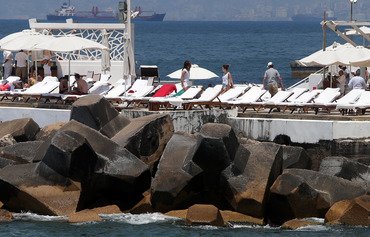After a year of tense relations with Saudi Arabia primarily triggered by Hizbullah's involvement in the war in Syria , Lebanon is seeking to resume its financial, educational and security co-operation with the kingdom.
Last week, Lebanese President Michel Aoun visited Riyadh with a delegation of ministers to try "to find some fields of co-operation" between the two countries.
Yemen's war has been another factor in the cooling of relations between the two countries, with the Saudis condemning Iran-backed Hizbullah's support of the Houthis (Ansarallah) .
As a result of these tensions, Saudi Arabia imposed a travel ban to Lebanon on its nationals and froze its $3 billion grant to the Lebanese army, which has adversely affected the Lebanese economy.
The value of Saudi investments in Lebanon between 1985 and 2009 reached $4.8 billion, according to the Centre for Economic Studies at the Lebanese Chamber of Trade and Industry.
Of this, 56% was invested in the real estate sector, 20% in the banking sector and 13% in the tourism sector.
With the normalisation of relations with Saudi Arabia, Lebanon is anticipating the revitalisation of economic and investment relations with the kingdom and other Gulf states.
"After the Lebanese-Saudi relations were damaged and almost reached a breaking point, we now see a gradual return of this relationship," said Lebanese MP Mohammed Qabbani, a member of the Future parliamentary bloc.
Lebanon's election of a president and formation of a new government, along with Aoun’s recent visit to the kingdom, have helped to restore relations and signal to the international community that Lebanon is recovering, he said.
"Several factors have contributed to the faltering of relations between the two countries, including Hizbullah’s intervention in the Syrian war and Lebanon’s failure to elect a president for two years, which put the country on the back burner in the international arena," he told Al-Mashareq.
"Today, Lebanon is correcting its course and seeking to remove any hurdles along the way," Qabbani said.
Mutually beneficial outcomes
The restoration of relations between Lebanon and Saudi Arabia "is mutually beneficial" to both countries, said strategy analyst Brig. Gen. Richard Dagher, a retired Lebanese military officer.
Saudi Arabia and the Gulf states have "a huge incentive to return to Lebanon" in light of recent events and "the Iranian expansion in the region", he told Al-Mashareq.
"Saudi Arabia will go to great lengths to prevent Lebanon from being swallowed by the Iranian axis," he said.
Co-operation between both countries will continue in the fight against terrorism since it is "a joint mission and a concern for everyone", he added.
Similarly, Lebanon will benefit from the return of investments, aid and tourists, which will help stabilise the country, Dagher said.
After Saad Harriri's government collapsed in 2011 and the country was drawn into the Syrian war through the actions of Hizbullah, Gulf investments in Lebanon came to a halt and the trade exchange between the two countries was hit, economist Jassim Ajaka told Al-Mashareq.
"The result was a halt to Gulf investments in Lebanon and a travel ban on Gulf tourists in Lebanon, as well as a suspension of the Saudi military grant to the army and the security forces," he said.
"Another setback was diminished trade between Lebanon and Gulf states, particularly with Saudi Arabia, which comes first among other Gulf states in terms of economic partnership," he added.
With the resumption of relations, "we will see Gulf investment capital making inroads into Lebanon... and an increased trade exchange", he said.
Since 2011, the Lebanese tourism sector has seen a 75% decrease in the number of Saudi tourists, he said, while Lebanese exports to Saudi Arabia have fallen by 25% and Saudi investments in Lebanon by 40%.
Ajaka said he was optimistic about the normalisation of relations between Lebanon and other countries in the region, but noted that "improved relations remain at the mercy of any developments in the Syrian crisis".

![Lebanese President Michel Aoun meets with Saudi King Salman during an official visit to Riyadh on January 9th and 10th. [Photo courtesy of the media office of Lebanon's presidency]](/cnmi_am/images/2017/01/20/7061-Saudi-Lebanon-meeting-600_384.jpg)







It is good. Please publish the news without censuring them.
Reply1 Comment(s)